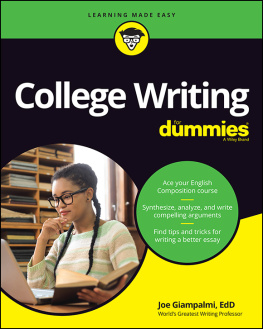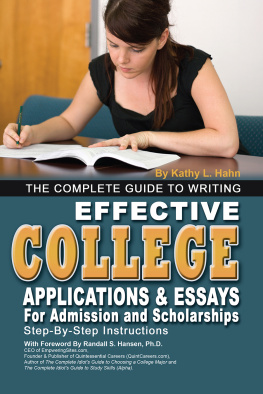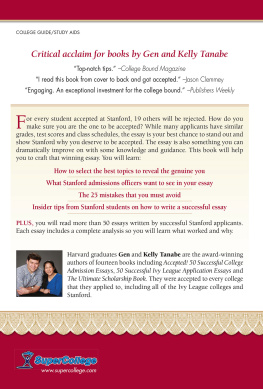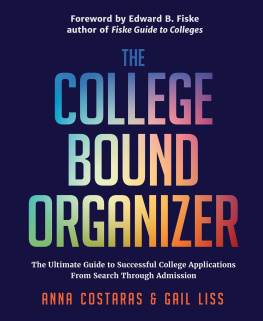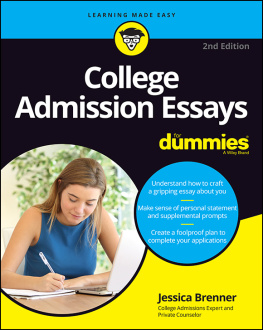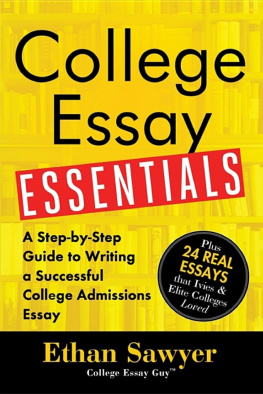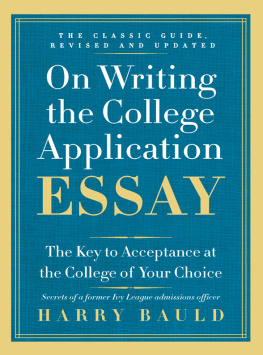Narrative Essays:
The Stories We Tell
THIS BOOK FOCUSES ON two modesor waysof writing. The first one is narrativestorytelling. And most importantly, this storytelling is done in the moment . In other words, instead of attempting to tell his or her life story, each of the authors of the following essays focuses on one or two moments to explore richly. The essays in this chapter illustrate the uses of action and dialogue, the two most important techniques for establishing narrative in the personal essay. While narrative is the central organizational mode for the personal essay, it is also something that you can use as much or as little as youd like. That is, narrative elements like action and dialogue can be excellent tools for starting off an essay that goes on to explore and reflect in lyric mode (see for more on proportion).
Even where the authors dont state outright what these events mean to them, what can you infer from their respective choices of narrative action and dialogue? How does the choice of writing about one event or the other characterize each author, in your opinion? Narrative allows the admissions reader to answer these questions by staying actively engaged with your essay. Instead of stating outright the importance or value of an experience, these authors largely let their narratives do the talking for them.
As you read this first set of essays, ask yourself what kinds of prompts each could answer. For most prompts that you encounter in college applications, narrative is the way to go regardless of the specific topic. By focusing on telling a controlled story, your essay can be used or modified to answer prompts for several schools applications.
Off the Table
Anonymous
In my first year of lessons, the half-hour car rides my dad and I endured to and from the club were awkward and silent. I, with my headphones plugged in, listened to the smooth jazz licks of Herbie Hancock to avoid the wall of silence that formed between our seats. After hundreds of trips, lengthy car rides to tournaments, and seemingly endless cross-country plane rides, that wall of silence between us began to wither.
Out in the Tennessee heat, I plopped myself on a bench. I had lost matches before but never with so much at stake, and especially in such a big upset. Then my dad took a seat beside me and put his hand on my back. He did not look happy. Then again, he did not look angry either, or even disappointed. He justlooked at me in a calm and casual manner.
Im not an expert, but I can tell you one thing about that match. You looked scared. Not nervous, but scared, he said. Shockingly, I was not bitter when he pointed out my flaws so bluntly. Indeed it was that moment when my dad became my perception of what a father should be. Unlike before, he did not approach the situation by trying to change the topic. He talked to me with full genuine attention, and that is when I finally recognized our assimilation into American culture and realized how far we had come as a family. The language and cultural barriers that came with being Korean immigrants had posed innumerable problems for us and made growing up in America more difficult than it should have been. Up until that point, we dealt with those problems by either ignoring the struggle or by simply accepting the complacency of not adapting. With those passive methods, we suppressed our emotions. Bonds between us stretched thin, and conversations grew short and superficial.
Most importantly, vulnerability was missing. Family members should not have to struggle to share their emotions with one another, but I fell victim to this. I had a lot to say. However, I knew that even if I were to share my feelings and thoughts, my parents would not be able to reciprocate, and not from a lack of love or a lack of parenting ability, but because they were inherently rooted in a different culture. For most of my childhood, my parents and I did not share the same linguistic and cultural threads with which to stitch this problem together. That turned around when I started playing table tennis. My parents traditional Korean values no longer clashed with my progressive American upbringing, and our two languages no longer got jumbled together, for table tennis became our focal point and our common language. The sport gave us excuses to be together on those long drives, allowed us to be trusting andmost importantlyemotionally vulnerable, and with that common point of reference between their past and my present, we were able to grow.
(Word count: 501)
I Cant Tell You
Sean Thammakhoune
My dad and I are on our way to Canobie Lake Park, an amusement park near my town. It is a small one, but it holds over a weeks excitement to any small ten-year-old boy. As we drive there, I think about all the rides. I love riding them, but seeing how they work is what keeps me coming time and time again. I often stand below a roller coaster to see the angles to be able to finish the track with only the force of gravity, or try to calculate how fast a ride has to spin in order for a person to magically stick on the wall.
With the excitement building up inside of me, I start thinking of all the rides that I am about to embark on. There must be a new ride that I can examine while zipping through its track. I think of asking my dad what we are going to see at Canobie, but I know that he probably will not tell me. He is a rather secretive person. I know that he is super passionate about his work, because he is almost never home. This is a rare occasion that I get to spend time with him, and I could not be happier. He does not tell me much, and I have come to expect that. But I am a very curious young boy, and I love to ask questions. Sometimes I think I begin to annoy him. All the excitement causes me to blurt out a question that I have wondered for years.
Hey, Daddy, I have a question for you. A serious one. What exactly do you do at your workplace? I know youre an engine-ear, but what do you do? I ask, thinking that there is a slight chance my dad designed a new ride.
I build stuff. For the military, you know. Ill show you what I mean when we get to Canobie in a few seconds. Were almost there, I promise. I cant tell you right now, but I will tell you this: we protect those who protect us, he replies.
I knew it. Canobie has a new ride that my dad built, and I can fly it like a jet, or maybe drive it like a tank. I rest my head back and relax, knowing that when I awake, I will be a small walk away from riding the best ride ever. When we arrive at Canobie, there is a twinkle in my eye. It is Military Day at the park, a day to showcase the vehicles used in combat. F-22 Raptor fighter jets are lined up in front of the roller coasters as if they are ready to take off and go into action, creating a breathtaking scene. The size, the flashiness, the slick design all stand out in the ray of sunshine gleaming off of the jets. The large desert-toned tanks stand tall in front of the jets and tower over us. I can feel intimidation completely drape over me, even though I know I am in a safe place. Suddenly, a stealth bomber flies overhead, and it feels like a war is about to initiate, and we are the helpless civilians caught in the middle. Once the crowd realizes that we are in fact safe, we let out a sigh of relief mixed with amazement.
We proceed to the tanks, the epitome of intimidation. I climb inside, my dad pushing my rear end so I can get high enough to grab the seat. The sophisticated controls catch my attention immediately, as I mash buttons left and right. I think of my dads previous answer. A spark ignites that fuels my passion for engineering. My dad pokes his head in, and I ask him if this is what he does, but he just smiles and takes my hand to leave.
(Word count: 650)
Fenway
Lindsey Luker
Thirty years from his glory days, the hockey player in my dad still shows. His eyes are constantly scanning, his foot placement is purposeful and smooth, and his shoulders are always tense, locked and ready to bear a hit. He walks a few steps behind me as we step onto the field to join thirty other people, also decked out in Red Sox apparel. My dad squeezes my shoulders and says, This is it, buddy. This is Fenway.
Next page


